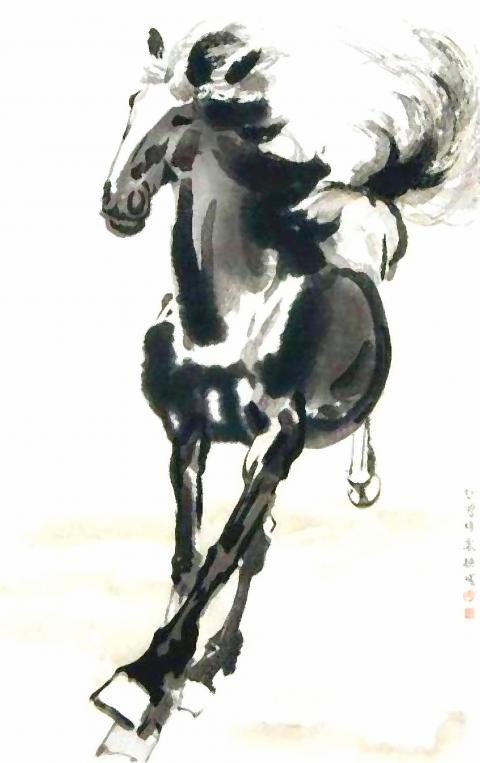Chinese Practice
塞翁失馬,焉知非福

Photo: Wikimedia Commons
照片:維基共享資源
(sai4 weng1 shi1 ma3 yan1 zhi1 fei1 fu2)
基督宗教的神學邏輯中一個顯而易見的矛盾是,既然上帝是仁慈的、愛我們的,為何還會任憑災難、苦痛和磨難存在?以上帝之全知全能,大可阻止這些事發生。這個矛盾即為英文成語「blessing in disguise」所隱含的意義。
英國牧師詹姆斯‧赫維(一七一四~一七五八),同時也是作家及詩人,以其對自然美景的描繪著稱。詩人威廉‧布萊克即對赫維的作品非常欽慕。「blessings in disguise」此語雖非出自赫維的創作,但它首次見諸書面,是赫維一七四六年的《花園的沉思》一書所引用的一首作者佚名的詩。這首詩談到了上帝「平等的愛、無法度量的良善」:
”Good when he gives, supremely good, nor less when he denies;
Even crosses, from his sovereign hand, are blessings in disguise.”
「祂是美善的,至高的善,無論是祂給予時,或當祂拒絕給予時;從祂握有至高權力的手所給出的,即便是要背負十字架的磨難,也都是隱藏的祝福。」
十字架在基督宗教中,是苦難和犧牲的象徵。對此有個解釋是說,所發生的一切必為上帝計劃的一部分,因此是直接出自上帝的旨意,也因此必然是對事物總體計畫有益的祝福,即便以一己之觀點來看,不會認為是件好事。此語在現代用法中的意義又更為寬宏,其意為,有時看來對某人不利的事物,最終會證明是有利的。例如,失業可說是很慘的,但這會促使我們找到一個更好的工作。
一件事究竟是福是禍,取決於描述事情的時間點為何。漢代成書的《淮南子》〈人間〉中,北中國邊塞一位老翁的故事,可以印證這個概念。
這故事是說,某日,一位養馬的老翁有匹馬逃跑了,馬越過了邊界進入北方游牧民族的領土。老翁的鄰居因他所受的損失都來安慰他,但他質疑鄰居為何覺得這是件不幸的事。幾個月後,這匹馬回來了,還帶回了北方的駿馬。鄰居為他的幸運之財道賀,但他又再度質疑鄰居認為幸運的理由。我們由故事後續所知,不久後,老翁的兒子便在騎這些駿馬時墜馬,跌斷了腿,但老翁仍拒絕把這事看作是一件災禍。後來北方的游牧民族入侵,該地區的壯都被徵召入伍,許多人都戰死了,但老翁的兒子因瘸腿而得以留在家中,保住一命。這個故事便是成語「塞翁失馬,焉知非福」的由來,其意相當於英諺「blessing in disguise」。
(台北時報林俐凱譯)
這對情侶分手了,卻各自找到了更適合的對象,可以說是塞翁之馬,焉知非福。
(The couple split up, but both found a more suitable partner. Each could see the separation as a blessing in disguise.)
我們不應為一時的成敗患得患失。要知道,塞翁之馬,焉知非福,只要我們從經驗中學習,永遠都有機會東山再起。
(We shouldn’t get despondent about individual failures. From experience we should know that things change, and there’s always hope.)
英文練習
blessing in disguise
One of the apparent contradictions in the logic of Christian theology is how it is that a merciful, loving God would allow disaster, pain and suffering to exist, when an omnipotent being could presumably prevent such things from happening. That contradiction is broached in the idea underlying the English idiom “blessing in disguise.”
The English clergyman James Hervey (1714–1758) was also a writer and poet known for his appreciation of natural beauty. The poet William Blake was an admirer of his work. Although he didn’t coin the phrase himself, the first known appearance in print of the proverb is a citation of an anonymous poem in Hervey’s 1746 book Reflections on a Flower-Garden. The poem talks of God’s “equal love, unmeasurably kind” and says:
“Good when he gives, supremely good, nor less when he denies;
Even crosses, from his sovereign hand, are blessings in disguise.”
The cross is a Christian symbol of suffering and sacrifice. One interpretation of this is that everything that happens is, by definition, part of God’s plan, and is therefore directly from God, and therefore necessarily a blessing, good in the overall scheme of things, even if impossible to regard as beneficial on the individual level. In modern usage, the proverb takes a more generous view, that something that appears to be detrimental eventually proves to be beneficial to the individual. Losing one’s job can be seen as disastrous, until this leads to finding a far better one.
One could also say that whether the implications of an event are ultimately fortunate or disastrous depends upon the randomly designated point at which a narrative begins and ends. This idea is illustrated in the story of an old man living by a strategic pass on the northern Chinese border from the In the World of Man chapter of the Han Dynasty collection the Huainanzi.
One day, the story goes, one of the man’s horses escaped, and ran across the border into the territory of the northern nomads. His neighbors tried to console him, but he questioned how they would regard it as misfortune. Several months later, the horse returned, bringing with it magnificent northern steeds. The neighbors celebrated his fortune, but he again questioned their reasoning. His son, in fact, would fall from one of those steeds and break his leg, but still the man refused to view this as a disaster. When the northern nomads invaded and the able-bodied men of the area were conscripted, many of whom were killed fighting the invaders, the man’s crippled son stayed home. The idiom is 塞翁失馬,焉知非福 (the old man lost his horse, but who can tell that this was unlucky), derived from this story, is roughly equivalent to the English proverb “blessing in disguise.”
(Paul Cooper, Taipei Times)
My husband thinks his losing his job was a blessing in disguise. Perhaps for him; for me, it couldn’t have come at a worse time.
(我先生覺得他失業是因禍得福。對他來說或許的確如此,但對我來說,沒有比這個時間點更糟了。)
It sounds like bad news, but perhaps this will turn out to be a blessing in disguise.
(這聽來像是壞消息,但塞翁之馬,這或許畢竟會是件好事。)

Computex, Asia’s biggest electronics conference, kicked off Monday in Taipei, and as in years past drew industry chieftains from Nvidia Corp.’s Jensen Huang and Qualcomm Inc.’s Cristiano Amon to Young Liu of Foxconn, which makes the bulk of the world’s iPhones and Nvidia servers. But while last year’s event was a celebration of the post-ChatGPT AI boom, executives this time are likely grappling with the uncertainty of the Trump administration’s effort to reshape the global trade order — disrupting a decades-old model for tech manufacturing. This year’s exhibition will of course feature the hardware required to bring artificial intelligence to life.

Dog owners often wish they could understand their pets’ thoughts. “Dog buttons” might turn their dream into a reality. These specially designed buttons, __1__ sound chips, enable dogs to communicate their needs by pressing buttons corresponding to pre-recorded words like “walk,” “play,” “outside,” and “food.” This bridges the communication __2__ between humans and their canine companions. The science behind dog buttons is based on the concept of associative learning. It’s a process __3__ learners can link actions with outcomes. For instance, if an owner consistently presses the “walk” button and then takes their dog for a walk, the dog

For many people, allergies are an all-too-familiar annoyance. The constant sneezing, itching, and watery eyes are just a few clear signs of allergies, which is a surprisingly common condition affecting millions worldwide. But what exactly triggers these reactions, and how can we cope with them? Allergies arise from a misunderstanding between our immune system and seemingly harmless substances. Under normal circumstances, the immune system acts as our body’s personal bodyguard, diligently identifying and eliminating threats like viruses and bacteria. However, in individuals with allergies, the immune system mistakenly identifies certain substances, called allergens, as invaders. This triggers a reaction, leading to

1. 眾所皆知,資訊產業是我國經濟的基礎。 ˇ As everyone admits, the IT industry is the backbone of our economy. χ As everyone admits that the IT industry is the backbone of our economy. 註:這裏 as 作關係代名詞,引導從屬子句。誤句多了 that, IT industry is. . . 就變成從屬句,欠缺了主句,結構上錯誤。又如: As my friend pointed out, necessity is the mother of invention. As is known to all, grammar is not the only important thing in language study. 2. 她心情總是非常好。 ˇ She is always in a good mood. χ She always is in a good mood. 註:always, often 一般放在行為動詞之前,連繫動詞、助動詞之後: He always behaves well. He is always happy and gay. He is always reading. 其他用法類似的副詞,還有 still、also、hardly、seldom、never 等。 3. 你看!他還在寫報告呢。 ˇ Look! He is still working